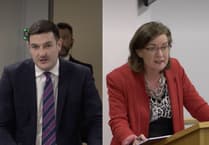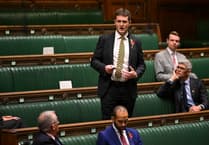The Welsh Parliament has rejected calls to force local authorities to hold a referendum on any council tax rise more than five per cent.
Sam Rowlands led a Conservative debate on local government funding which also called for a review of the funding formula and urged councils to use reserves to keep council tax low.
Mr Rowlands, who was leader of Conwy County Borough Council before his election to the Senedd in 2021, described the funding formula as fundamentally unfair.
The shadow local government minister claimed councils in north Wales and rural areas are punished by a “winners-and-losers” system.
He raised the example of a £20m, or 15 per cent, funding gap between Denbighshire and neighbouring Conwy councils in the past financial year.
“It’s very, very hard to see why such a discrepancy is in place,” he said.
Mr Rowlands told the Senedd that council tax has increased by more than £900 per household, or 200 per cent, under the Labour-led Welsh Government.
‘Excessive’
He also raised concerns about £2.75bn being held in council reserves, saying some have managed to squirrel away excessive amounts while others struggle.
Mr Rowlands recognised that it is important for councils to hold a level of reserves for a rainy day but “some would say it is now pouring with rain”.
He said some councils are now having to consult on council tax rises of up to 25 per cent.
Calling for taxpayers to be given a greater say, he told MSs: “Any local authority proposing a council tax rise of over five per cent should be required to hold a local referendum.
“This would increase accountability…. It would also increase public involvement.”
Mr Rowlands hailed a UK Government announcement of an extra £600m for local authorities in England, calling for consequential funding for Wales to be passed to councils
‘Unsustainable’
Peredur Owen Griffiths warned that councils are facing an existential crisis.
Plaid Cymru’s shadow minister said the UK public accounts committee revealed that Wales’ 22 councils are facing a combined debt of £5.6bn.
Mr Owen Griffiths said: “Local government finances in Wales are on an unsustainable trajectory, with a £354m funding gap projected during the next financial year.”
Warning that it could balloon to £750m by 2027-28, he said significant hikes in council tax are regrettably likely as local authorities try to “mitigate Westminster’s mess”.
He highlighted his party’s joint work with the Welsh Government on reforms to council tax, which he described as a regressive type of tax that unfairly penalises the most deprived.
He raised concerns about councils being expected to foot the bill for a five per cent increase in teachers’ pay from existing budgets.
The South Wales East MS also called for the Barnett formula to be reformed to end the “chronic underfunding of Wales by successive UK Governments”.
‘Unconscionable’
Peter Fox, the Conservative MS for Monmouth, described the 3.1% settlement for councils as poor and a huge real-terms cut.
The former Monmouthshire Council leader said the settlement is worth an extra £170m but the pressure on social care alone is estimated at £230m.
He told MSs: “As a past long-standing council leader, I know difficult choices must be made, and councils have to work with the budget they are given.
“Yes, we can challenge some of the decisions they make locally, and I'll certainly do that, but I think high tax hikes are unconscionable at a time when people are already struggling.”
Mike Hedges, a Labour MS, raised the importance of standard spending assessments (SSAs) – the mechanism for distributing the revenue support grant which funds councils.
The Swansea East MS criticised Welsh ministers for refusing to publish SSA calculations, saying: “The failure to print these calculations makes people less trusting of the published figures and we end up with these Conservative debates every year.”
Jack Sargeant, a fellow Labour backbencher, who represents Alyn and Deeside, urged councils to bring forward their own proposals to reform the funding formula.
‘Damaging’
Jane Hutt, for the Welsh Government, said the funding settlement from Westminster is insufficient to respond to the extraordinary pressures Wales faces.
She told the Senedd that the UK chancellor’s autumn statement means public services face deep and damaging cuts, saying “His choices have made our decisions harder.”
Ms Hutt said it is wrong to take the technical description of useable reserves and suggest this can all be used to ease pressures this year without worrying about the future.
She raised the importance of the balance between maintaining services and limiting the burden on households when setting council tax, which raises about £2bn a year.
She told MSs: “The Welsh Government doesn't impose an artificial cap on council tax decisions, and we don't impose the additional costs and burden of a local referendum.”
Turning to the £600m for English councils, she said the Welsh Government was given no notice of the announcement as she accused UK ministers of disrespect.
She told the chamber that there is no certainty on the level of consequential funding. The Tory motion was defeated, 12-32, after the debate on Wednesday, 24 January.
Plaid Cymru’s amendment also fell as MSs agreed the motion as amended by ministers.





Comments
This article has no comments yet. Be the first to leave a comment.